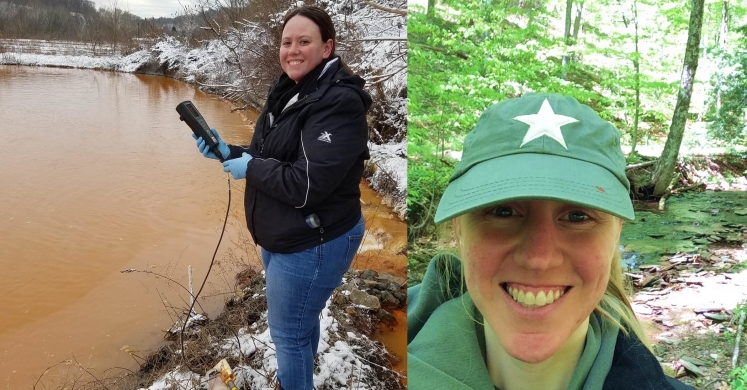Phipps Stories

Meet a Scientist: Michelle Valkanas and Sara McClelland
All of the researchers featured on our Meet a Scientist Saturdays have been trained through Phipps’ science communication workshops. If you are young professional or graduate student in the sciences and you are interested in the workshop or participating in a Meet a Scientist Saturday, check out our website or email our science education outreach manager Dr. Maria Wheeler-Dubas for more information.
What do you get if you mix herpetology (the study of amphibians and reptiles) with microbiology (the study of tiny organisms) with a dash of chemistry and local Pennsylvania water quality issues? You get the two researchers from this month’s Meet a Scientist Saturday! This Saturday, May 19, from 1:30 – 3:30 pm local doctoral students Michelle Valkanas and Sara McClelland, both from Duquesne University, will be in the Tropical Forest to share their research with you. Read a bit more about Michelle and Sara below, and be sure to stop by Saturday to meet these two inspiring women in science.
Introduce yourself in five sentences or less:
Michelle: Hello! My name is Michelle Valkanas, and I am entering my third year as a PhD Candidate at Duquesne University. I am an environmental microbiologist, and I study abandoned mine drainage. Specifically, I study the bacteria found in passive remediation systems built to treat abandoned coal mine drainage. I investigate ways to use the bacteria already present in the environment to treat contaminated water. Furthermore, I aim to identify potential bacteria, referred to as bioindicators, that can reveal the condition of a watershed (i.e. streams, rivers, lakes, etc.).
Sara: Hi, my name is Sara McClelland and I’m a biology PhD student at Duquesne University. I love hiking, playing in streams and looking for animals, and believe it’s up to all of us to keep the environment healthy. I’m interested in understanding how the choices we make impact the environment, so that we can try to find ways to have less of a negative impact on the planet. This has led into my current PhD research, which is analyzing how pesticides affect the development, physiology, and behavior of tadpoles and frogs.
Why did you become a scientist?
Michelle: I have always been fascinated by the way the world around us seems to be all intertwined- that everything has a purpose. This intrigue lead to a drive to better understand this communal relationship. As a scientist, I get to spend every day seeking out answers to the unknown.
Sara: I decided to become a scientist because I’m curious about the way the world works, and science gives us a way to answer our questions about the world.
What is your favorite part of your job?
Michelle: I love being in the lab! “Bench work” is my favorite. I love seeing my hypotheses tested and the results that come from it, even if they weren’t what I was expecting. It is truly amazing what bacteria can do.
Sara: My favorite part of being a scientist is analyzing the data I’ve collected to figure out what it means. This is what leads to new discoveries!
Why is science education important?
Sara: The most pressing issues that face us today rely on scientists doing research to find the answers to our problems or cures to our diseases. In order for these findings to have the most impact in society, people need to trust science. However, I don’t think people can really trust science unless they understand how science proceeds and what exactly scientists are doing to come to their conclusions.
Michelle: I believe that science education is important because science is often not readily available to everyone. Science invokes curiosity, innovation, and exploration. It is important for people to have access to the science that is occurring around them, specifically right here in Pittsburgh! Incredible inventions and discoveries are happening right here in our backyard! It is also equally important to stimulate a child’s interest in science at a young age, a passion for science at an early age is often what leads an individual down the path of science for a lifetime. Being a small part of sparking that passion in our future scientist is truly a rewarding experience.
Be sure to stop by and meet these two local scientists on Saturday, May 19, from 1:30 – 3:30 pm in the Tropical Forest Cuba at Phipps!

